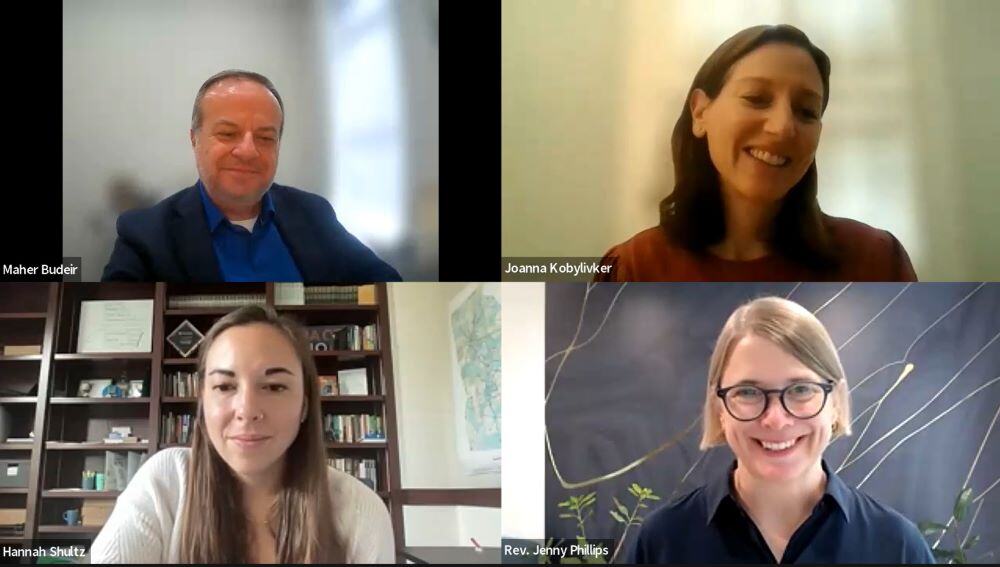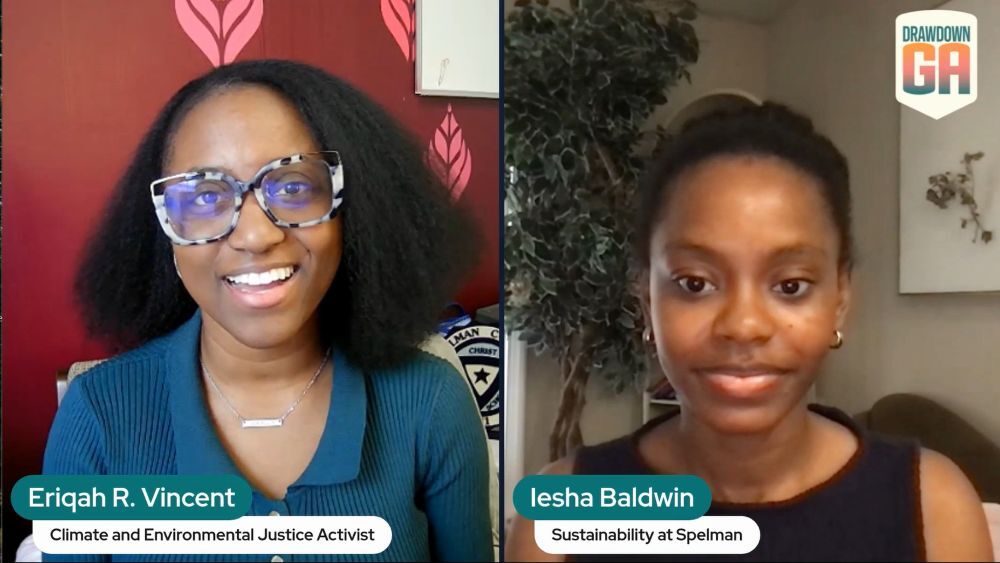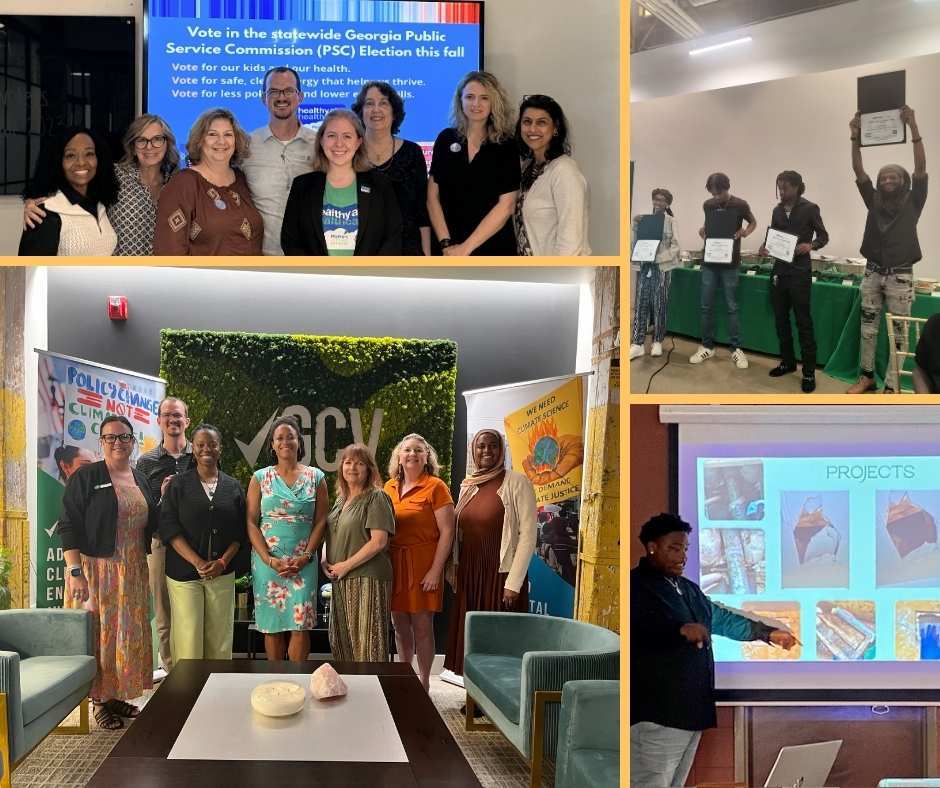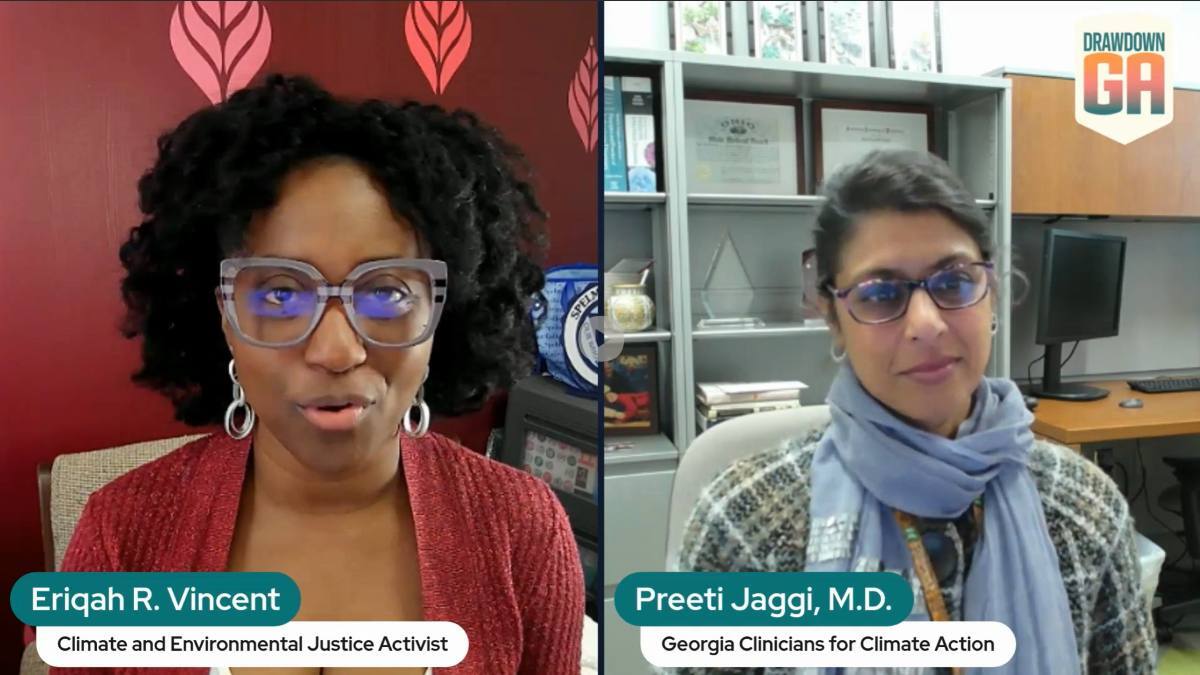Georgia congregations are playing a vital role in ensuring that climate solutions benefit all people through a healthy environment, a stable climate, and resilient communities.
One of the simplest ways for communities of faith in Georgia to take action toward creating this world is to advance critical climate solutions within their own communities of faith.
Drawdown Georgia co-hosted a conversation with Georgia Interfaith Power & Light (GIPL) to hear from representatives from three different faith communities about how their congregations across our state are working to reduce greenhouse gas emissions and help solve for climate.
Watch the full, hour-long recording below, or keep reading to learn more.
Climate Solutions for Congregations With Georgia Interfaith Power & Light
In her introduction, Hannah Shultz, Program Director at GIPL, began by outlining the organization's mission to support faith communities across Georgia in implementing practical climate solutions. GIPL, an interfaith environmental nonprofit, helps congregations organize Green Teams and adopt sustainable practices such as energy efficiency upgrades, solar installations, and EV charging stations. A key challenge for many faith communities is knowing where to begin in addressing the climate crisis, and this is where GIPL steps in to guide them.
Hannah highlighted GIPL’s collaboration with Drawdown Georgia and their work to adapt the roadmap of 20 climate solutions designed to be accessible and actionable for both individuals and congregations. These solutions include many that are well-suited to communities of faith, such as energy efficiency improvements, composting, and tree planting. GIPL’s programs are structured around these solutions to help congregations take meaningful action.
She concluded by noting the powerful role faith communities can play as leaders in the climate movement, given the shared ethic of environmental stewardship across major religious traditions. By implementing these solutions, congregations can serve as role models, showing what’s possible and inspiring wider community action.
Reverend Jenny Phillips and the United Methodist Church
Reverend Jenny Phillips is the Director of Environmental Sustainability at the General Board of Global Ministries, the worldwide mission, relief, and development agency of The United Methodist Church. She pilots and integrates sustainability practices for agency operations and programs, including domestic and international disaster response, global health, and agriculture, and she works with faith communities on solar, energy efficiency, land use, waste management, and other programming.
A Sacred Calling to be Responsible Stewards of Creation
In her presentation, Jenny emphasized the critical role that faith communities are playing in advancing climate solutions and fostering resilience in the face of environmental challenges. Central to this movement is the reaffirmation of faith traditions that recognize the sacred duty to be responsible stewards of creation.
The UMC, alongside many other faith-based organizations, has articulated commitments to care for the Earth, rooted in a deep spiritual acknowledgment of the interconnectedness of all life and the inherent worth of the natural world. The speaker highlighted that these values, while present in the doctrines of many religious institutions, need to be continuously uplifted in day-to-day church activities to inspire action.
The UMC’s Commitment to Equity and Net Zero Emissions by 2050
A key example of the UMC's commitment to environmental stewardship is its pledge to achieve net-zero emissions by 2050. This ambitious goal covers all aspects of the denomination's operations, including ministries, facilities, and investments.
Jenny stressed that this work is not only about reducing emissions but also about addressing climate justice, recognizing that the effects of climate change disproportionately impact marginalized communities.
As a result, the UMC’s climate efforts prioritize equity, ensuring that solutions to environmental challenges uplift those who are most vulnerable, such as people affected by poverty and systemic racism.
Solar Trailers for Disaster Response
One of the innovative projects Jenny highlighted involves the UMC's disaster response efforts. Traditionally reliant on diesel generators to provide emergency power, the church has begun integrating solar energy into its disaster relief programs. Solar microgrid trailers, equipped with inverters and batteries, are being deployed in areas hit by natural disasters, such as Georgia and Florida, offering a cleaner, sustainable alternative to diesel generators.
Beyond immediate disaster response, the UMC is also supporting long-term sustainability efforts in underserved communities worldwide. For instance, in areas with limited access to electricity, such as remote medical clinics, the church is integrating solar power solutions to reduce reliance on diesel generators, thus improving health outcomes by providing clean, quiet energy.
Jenny also discussed the UMC’s focus on training and equipping local congregations through programs like EarthKeepers. This initiative empowers individuals to develop environmental projects in their own communities, incorporating anti-racist frameworks and focusing on equity and justice in climate solutions.
Maher Budeir of Roswell Community Masjid
Maher Budeir is a civil and environmental engineer by training and a co-founder of the Roswell Community Masjid. He has lived in the northern Atlanta suburbs for over 25 years and, during that time, has leveraged his training to aid the larger non-profit community as well as the Muslim communities across the area to be more thoughtful and resourceful in the design and operation of their organizations and buildings.
Roswell Community Masjid’s Commitment to Climate Solutions
In his presentation, Maher shared the inspiring journey of the mosque’s commitment to sustainability and environmental stewardship. Since its founding, the RCM has worked toward being a green institution, starting with small energy efficiency projects in partnership with organizations like GIPL.
Now, as the community plans for its future campus, they have embraced an ambitious vision: building a mosque that aligns with the principles of the Living Building Challenge, one of the world’s most rigorous green building standards.
Maher explained that the decision to pursue the living building model is rooted in RCM’s desire to be holistic in its approach to sustainability, combining ecological stewardship with social justice, equity, and cultural expression. This innovative building concept not only conserves resources like water and energy but also aims to respect the environment and honor the place where the mosque is being built.
By embodying these values in their new campus, RCM hopes to create a space that reflects their community’s spiritual principles while fostering a deeper appreciation for these ideals in the broader community.
Living Buildings and Community Well-Being
The Living Building Challenge goes beyond simply constructing an eco-friendly structure. It requires that the building actively contribute to the well-being of its occupants and the surrounding environment throughout its lifetime. For RCM, this means creating a space that enhances psychological and social well-being, promotes equity, and strengthens the community’s connection to nature.
One example is the plan to preserve significant portions of the land as communal green spaces, which will serve as areas for reflection and gathering, promoting a sense of tranquility and respect for the natural world.
Recycled Building Materials Honoring History
Additionally, RCM has taken care to honor the history of the site, incorporating reclaimed materials from a 75-year-old barn that once stood there. In partnership with local organizations, they meticulously deconstructed the barn to salvage and repurpose the wood for the new building, demonstrating a commitment to sustainability and respect for the past.
This thoughtful design approach, which utilizes natural light and environmentally respectful materials, aligns with the mosque’s mission to create a space that enhances both spiritual and environmental harmony.
Roswell Community Masjid Seeks to Inspire on Sustainability
Budeir emphasized that while the project is ambitious for a small organization, RCM sees it as an opportunity to spark larger conversations about sustainability in faith communities. Their hope is that the new mosque will serve as a pilot project, inspiring other communities to pursue similar initiatives and share in the responsibility of environmental stewardship.
By documenting and sharing their experience, the Roswell Community Masjid aims to demonstrate how faith-driven action can lead to meaningful contributions toward climate resilience and sustainability.
Joanna Kobylivker and Adamah ATL
Joanna Kobylivker is the director of Adamah ATL, a local chapter of the National Adamah Organization, which works to connect people and the planet in Atlanta through Jewish environmental organization, climate action, and youth empowerment. She also serves as a Jewish community organizer for GIPL.
Introduction to Adamah ATL: Sustainability and Youth Empowerment
In her presentation, Joanna shared how Adamah ATL is advancing sustainability efforts in Georgia through education, climate action, and community engagement. Adamah’s mission is to deepen the connection between Jewish life and the earth, catalyzing cultural and systemic change through immersive experiences and leadership development. Adamah ATL, one of five impact hubs across the U.S., focuses on fostering this connection in the greater Atlanta area by integrating Jewish environmental education with climate solutions and youth empowerment.
One of the key ways Adamah ATL brings its mission to life is through hands-on environmental education. This includes lessons that connect Jewish customs and holidays—many of which are tied to agricultural cycles—with modern environmental awareness.
Programs like tree plantings, river cleanups, and pollinator education offer practical ways for people of all ages to engage with these teachings. Adamah also works with local Jewish institutions, helping synagogues reduce their carbon footprints by decarbonizing their buildings and implementing sustainability measures in partnership with organizations like GIPL.
Youth empowerment has become a growing focus for Adamah ATL. Recognizing the climate anxiety that many young people feel, the organization offers tools and strategies to help Jewish teens and college students lead change in their communities. Whether it's encouraging schools to reduce single-use plastics or advocating for more recycling and composting, the programs equip young leaders to take tangible actions that align with their values. Through this empowerment, Adamah helps the next generation find their voice in the climate movement, offering guidance on how they can turn their concerns into impactful solutions.
Climate Action Plans from the Jewish Climate Leadership Coalition
Adamah's climate action work is centered on its Jewish Climate Leadership Coalition, a free national network that provides resources, support, and gentle accountability to Jewish institutions looking to reduce their environmental impact. Members of the coalition create climate action plans using a checklist that helps them track their progress in areas such as building decarbonization, renewable energy use, and more.
Adamah’s approach celebrates progress at any stage, meeting institutions where they are and encouraging joyful community participation in efforts like tree plantings and wildflower seeding.
In Atlanta alone, 11 Jewish institutions have joined the coalition, while nationwide, the network includes about 350 members. Adamah ATL also fosters a strong sense of community through events that bring people together with a climate-focused purpose.
By providing institutions and individuals with the tools, funding options, and connections they need, Adamah ensures that no one has to tackle these challenges alone. The representative closed by emphasizing the power of collaboration, sharing that best practices from one institution can inspire and guide others, making it easier to take collective action toward a sustainable future.
Connect with the Drawdown Georgia Climate Community
Don’t miss out on events and new resources from Drawdown Georgia! Click the button below to subscribe to the Georgia Climate Digest and receive climate news and event updates in your inbox twice per month.









